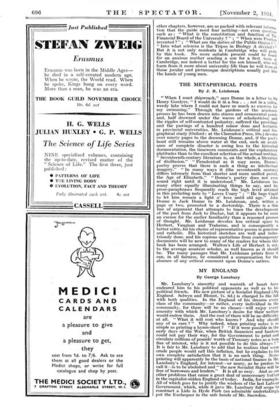" When I must shipwrack," says Donne in a letter
to Sir '1 Henry Goodyer, " I would do it in a Sea . . . not in a sullen, weedy lake where I could not have so much as exercise for my swimming." Through the gardens of the academic presses he has been drawn into stucco and ornamental ponds and, half drowned under the waves of scholasticism and the ripples of self-contented pedantry, suffered the proddings and the pawings of a hundred minor dons and lecturers in provincial universities. Mr. Leishman's critical and bio- graphical study (Oxford : at the Clarendon Press, 10s.) devotes over ninety pages to the drowning Donne, and, if the poet's head still remains above water at the end, such an avoid- ance of complete disaster is owing less to the historical documentation, the timeworn comments and the explanatory platitudes than to the excellent selection of the actual writings. " Seventeenth-century literature is, on the whole, a literature of disillusion." " Paradoxical as it may seem, Donne's poetry proves that there is such a thing as intellectual imagery." " In many ways it (the seventeenth century) differs intensely from that shorter and more unified period, the Age of Elizabeth." " Donne's poetry does not even sound right until it is understood." Mr. Leishman has many other equally illuminating things to say, and his prose-paraphrases frequently reach the high level attained in this preluding note to " Loves Usury " : " He begs Cupid to let him remain a light o' love until old age." John Donne is Jack Donne to Mr. Leishman, and, within a page or two, promoted to a doctorship. There is a thin line of argument that attempts to trace the development of the poet from Jack to Doctor, but it appears to be more an excuse for the earlier familiarity than a reasoned process of thought. Mr. Leishman devotes less critical space to Herbert, Vaughan and Traherne, and is consequently a better critic, for his choice of representative poems is generous and catholic. His historical sketches are well and indus- triously done, and his copious quotations from contemporary documents will be new to many of the readers for whom this book has been arranged. Walton's Life of Herbert is not, to the average amateur scholar, as well known as it should be. The many passages that Mr. Leishman prints from it can, in all fairness, be considered a compensation for the absence of any critical comment upon Donne's satires.














































 Previous page
Previous page